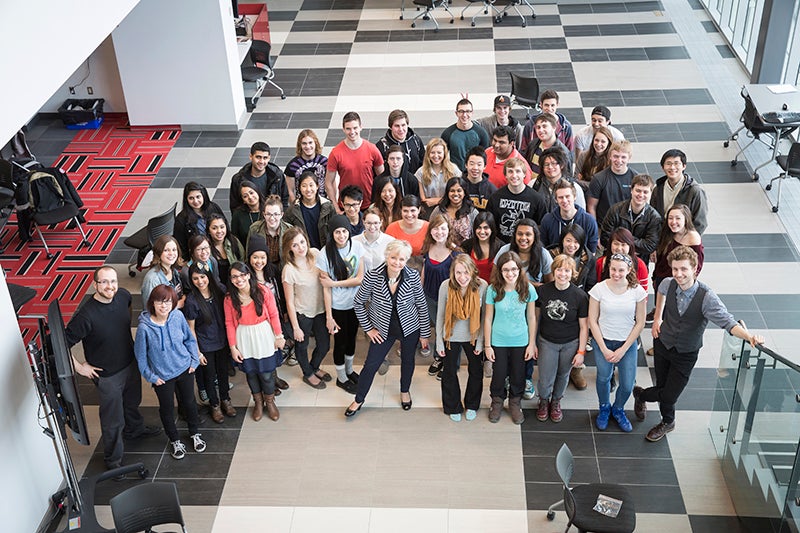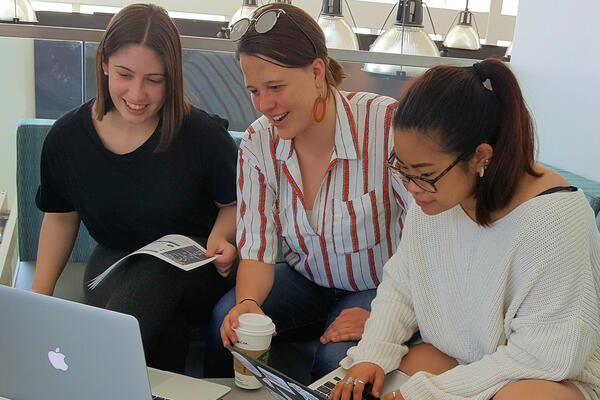
Celebrating 10 years of the Stratford School of Interaction Design and Business
The University’s Stratford School plays a vital role in connecting technology with creativity and business

The University’s Stratford School plays a vital role in connecting technology with creativity and business
By Angelica Marie Sanchez University RelationsIt all began as a partnership between the city of Stratford and the University of Waterloo. The Stratford School of Interaction Design and Business opened its doors in 2012, with the first cohort to receive their Master of Digital Experience Innovation (MDEI) degree later that year. Now, the Stratford School celebrates a decade of social innovation, interdisciplinary teaching and research.
“At its heart, the Stratford School embodies the core University of Waterloo principle of taking a human-centred approach to technology while recognizing its social, cultural and environmental impact,” says Dr. Vivek Goel, Waterloo’s president and vice-chancellor.
In just ten years, the Stratford School has grown from only 16 students to a population of more than 700, including undergraduate and graduate programs in on-campus and online education. The School continues to grow at a rate of 20 per cent per year.
Read individual Tweet on Twitter
Today the School is home to 16 faculty members versed in interdisciplinary education and research, combining their expertise in design, business, user experience and computer science. Students are empowered to solve some of the most pressing global problems often found at the intersection of society and technology. With its growing research profile, the School helps strengthen national and global communities by improving interactions between users and products, customers and businesses, and citizens and governments.
“The Stratford School synthesizes humanities and social sciences’ insights with the perspectives of global business, recognizing that, in an increasingly interconnected world, we must design experiences, services, and products that promote, rather than undermine the overall health of civil society,” says Dr. Christine McWebb, director of the Stratford School.
“Our students are encouraged to make intentional choices about the meanings of designs, their social, economic, cultural and material impacts, and their sustainability for the people and communities who use them. The School leverages its strengths in different ways to serve as both a national leader and local incubator for innovations in higher-education.”
Christine McWebb appeared on the Beyond the Bulletin podcast to discuss the history and future of the Stratford School of Interaction Design and Business.
Tom Jenkins, chair of the board at OpenText, a company founded by University of Waterloo professors, is a long-time supporter of the Stratford School. He reflects on its origins, “We had a need for individuals that were skilled both in media as well as computer science and the goal was to create in one graduate someone that was comfortable telling a story and writing code.”
Students learn how to combine these disciplines through two unique programs. Undergraduate students are enrolled in the Global Business and Digital Arts (GBDA) program — Canada's first undergraduate program to combine creativity, technology and business into one unique degree with mandatory co-operative education. And graduate students are enrolled in the MDEI program that offers superior professional education for students seeking careers in digital media.

Throughout the years, the Stratford School has maintained a strong connection with industry partners and continues to collaborate with business to ensure students gain the future-ready skills they need to succeed in a rapidly changing workforce.
In 2017, the Blend Design + Business Conference (BLEND) was launched to highlight how the power of design has become a secret to business success. BLEND brings together industry leaders and students to combine ideas and learn about business and design. BLEND 2023 conference is scheduled to be held in the spring term of 2023.
In 2019, Stratford students launched the Creator’s Collective a club to showcase the design and creative pursuits of their fellow classmates outside and inside the classroom. The Creator’s Collective hosts an annual Gallery which invites the public and industry partners to explore students’ creative and innovative work. With more than 150 attendees in its first year, the Gallery features student work ranging from live talks, podcasts and music to photography, paintings, video and books — plus opportunities for networking and a marketplace.
With 98 per cent of graduates landing jobs in technology, business or creative industries, the Stratford School is well-recognized by forward-thinking companies seeking designers who are digitally fluent, civic-minded and passionate about social change.
“After ten successful years with a proven track record of student and alumni success, I’m excited to see what the next decade has in store for the Stratford School as it continues to enhance and scale its programs while increasing the impact of its research,” Goel says. “They continue to be a leading resource for companies who need human-centred, civic-minded designers, who are passionate about creating solutions that positively impact pressing societal, economic and sustainability issues.”

Read more
Berlin Pang shares how clubs and co-op prepared her with the confidence to collaborate effectively in the workforce.

Read more
International competition challenges emerging designers to tackle complex issues facing business and society.

Read more
Supporting safer cybersecurity decisions and a privacy-conscious mindset for industry leaders and others grappling with pandemic stress
The University of Waterloo acknowledges that much of our work takes place on the traditional territory of the Neutral, Anishinaabeg, and Haudenosaunee peoples. Our main campus is situated on the Haldimand Tract, the land granted to the Six Nations that includes six miles on each side of the Grand River. Our active work toward reconciliation takes place across our campuses through research, learning, teaching, and community building, and is co-ordinated within the Office of Indigenous Relations.